| Gemstone Chart |
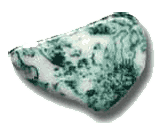 Natural Agate Natural Agate
Agate is a beautiful natural chalcedony stone, classified as a semi precious gem and has been used by people as early as the ancient Egyptians in and before 3000 BC! Agate is hard and tough enough to be incorporated into jewelry and other ornamental items.
Color: Blue, green, yellow,orange, brown, gray
Categories: semi-precious stone
Chemical Composition: SiO2
Crystal Group: Hexagonal
Refractive Index: 1.530 - 1.539
Hardness: 6.5 - 7
Density: 2.57 - 2.64
Occurrence: Scotland, U.S.A., India, England, Italy, Brazil, Uruguay, Germany, Egypt, Indonesia, and many other localities.
|  Natural Bi Color Tourmaline Natural Bi Color Tourmaline
Bi color tourmaline is the name given to tourmaline which displays more than one color in the same cystal.It is classified as a semi-precious stone.
Color: Green, red, yellow, orange. Brown, green, pink
Categories: semi-precious stone
Chemical Composition: (NaCa)(LI,MgFe,Al)9B3Si6(O,OH)31
Crystal Group: Hexagonal
Refractive Index: 1.624(+.005, -.005) - 1.644(+.006, -.006)
Hardness: 7-7.5
Density: 3.06 (.05, +.15)
Occurrence: East Africa, Brazil, USA, Afghanistan, Nigeria, Madagascar
| 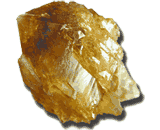 Natural Citrine Natural Citrine
Citrine is any quartz crystal or cluster that is yellow or orange in color. Although often cut as a gemstone, citrine is actually somewhat rare in nature.
Color: Yellow, orange
Categories: semi-precious stone
Chemical Composition: SiO2
Crystal Group: Trigonal
Refractive Index: 1.544-1.553
Hardness: 7
Occurrence: Brazil, Uruguay, Mexico, Russia, USA.
| 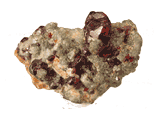 Natural Clinohumite Natural Clinohumite
Clinohumite is a rare mineral and an especially rare gemstone. It is a member of the humite group of minerals, which includes humite, clinohumite, chondrodite, and norbergite.Only two sources of gem-quality material are known: the Pamir Mountains of Tajikistan, and the Taymyr region of northern Siberia.
Color: Brown, yellow, white, orange, or reddish brown
Categories: semi-precious stone
Chemical Composition: Magnesium Silicate Fluoride OH
Crystal Group: Monoclinic
Refractive Index: 1.625 ĘC 1.668
Hardness: 6 - 6.5
Density: 3.17 - 3.35
Occurrence: Extremely rare - gem quality found only in the Pamir Mountains, Tadzhikistan. Other mineralogical occurrences include, Mt. Vesuvius, Italy; Pargas, Finland; Llanos de Juanar, Malaga, Spain; Tilly Foster Mine, New York; Fort Defiance, Apache County, Arizona; Crestmore Quarry, Riverside County and Lower Lake, Fresno County, California; Luna, New Mexico and Franklin, New Jersey, USA.
| 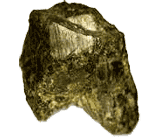 Natural Enstatite Natural Enstatite
Enstatite is a relatively common mineral, but is rarely used for jewelry purposes. It is generally cut for gem connoisseurs and collectors rather than for the common consumer.
Color: Gray, green, brown, orange-brown, yellowish-brown, colorless, pale yellow.
Categories: semi-precious stone
Chemical Composition: MgSiO3
Crystal Group: Orthorhombic
Refractive Index: 1.663-1.673
Hardness: 5.5
Density: 3.26-3.28
Occurrence: South Africa, Burma, Tanzania, Sri Lanka, Kenya, Germany, Norway, Greenland
| 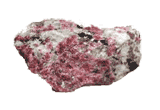 Natural Eudialyte Natural Eudialyte
eudialyte is a rare, plummy-red stone. Eudialyte's name comes from the Greek words "eu" and "dialytos", meaning "easy to dissolve" which refers to the mineral's solubility in acids.The stone's distinctive grey, black or white patterning gives each piece of jewelry a unique beauty.
Color: orange red
Categories: semi-precious stone
Crystal Group: Trigonal
Refractive Index: 1.596 - 1.602
Hardness: 5 - 6
Density: 2.88
Occurrence: Sweden; Kippaw,Canada
| 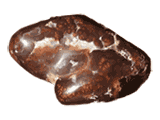 Natural Fire Agate Natural Fire Agate
Fire Agate is a variety of agate containing inclusions of goethite or limonite, it is a layered stone. The layers are small enough that light entering them forms interference colors known as "fire."
Color: Orange, green, purple, Red, blue, peacock
Categories: semi-precious stone
Chemical Composition: SiO2
Crystal Group: Trigonal
Refractive Index: 1.544 - 1.553
Hardness: 7
Density: 2.65
Occurrence: Central Mexico, Arizona USA
| 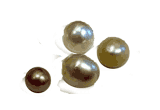 Natural Freshwater Pearl Natural Freshwater Pearl
Freshwater pearls are a kind of pearl that comes from freshwater mussels.Freshwater pearls come in many shapes from round to button shapes, from flat flakes to rice shapes and in many colors. As with the salt water Akoya pearl the round shapes are generally more expensive.
Color: orange, pink, white, gray, light purple, rose, black, brown, gold, yellow, silvery, green, blue, bronze.
Categories: semi-precious stone
Chemical Composition: CaCO3
Crystal Group: Not applicable
Hardness: 3.5 - 4.0
Density: 2.66 ĘC 2.78+
Occurrence: China, Japan
|
|
